HND Business Law Assignment: Sources of Law and Legal System Overview
VerifiedAdded on 2021/08/10
|31
|7002
|307
Report
AI Summary
This report, submitted for a BTEC Level 4 HND Diploma in Business unit, analyzes the fundamental concepts of business law. It begins by defining different sources of law, including case law and statute law, and explores their functions and roles within a legal system. The report then distinguishes between criminal and civil law, providing applications for both the UK and Vietnamese legal systems. It further examines the roles of the Parliament and Government in law-making, including the law-making process of Parliament. The report covers a range of topics from dispute resolution to the formation and regulation of social relationships, and discusses the development and reforming of UK legal systems. It also provides an overview of the Vietnamese legal system and concludes with a discussion on the significance of law in society.
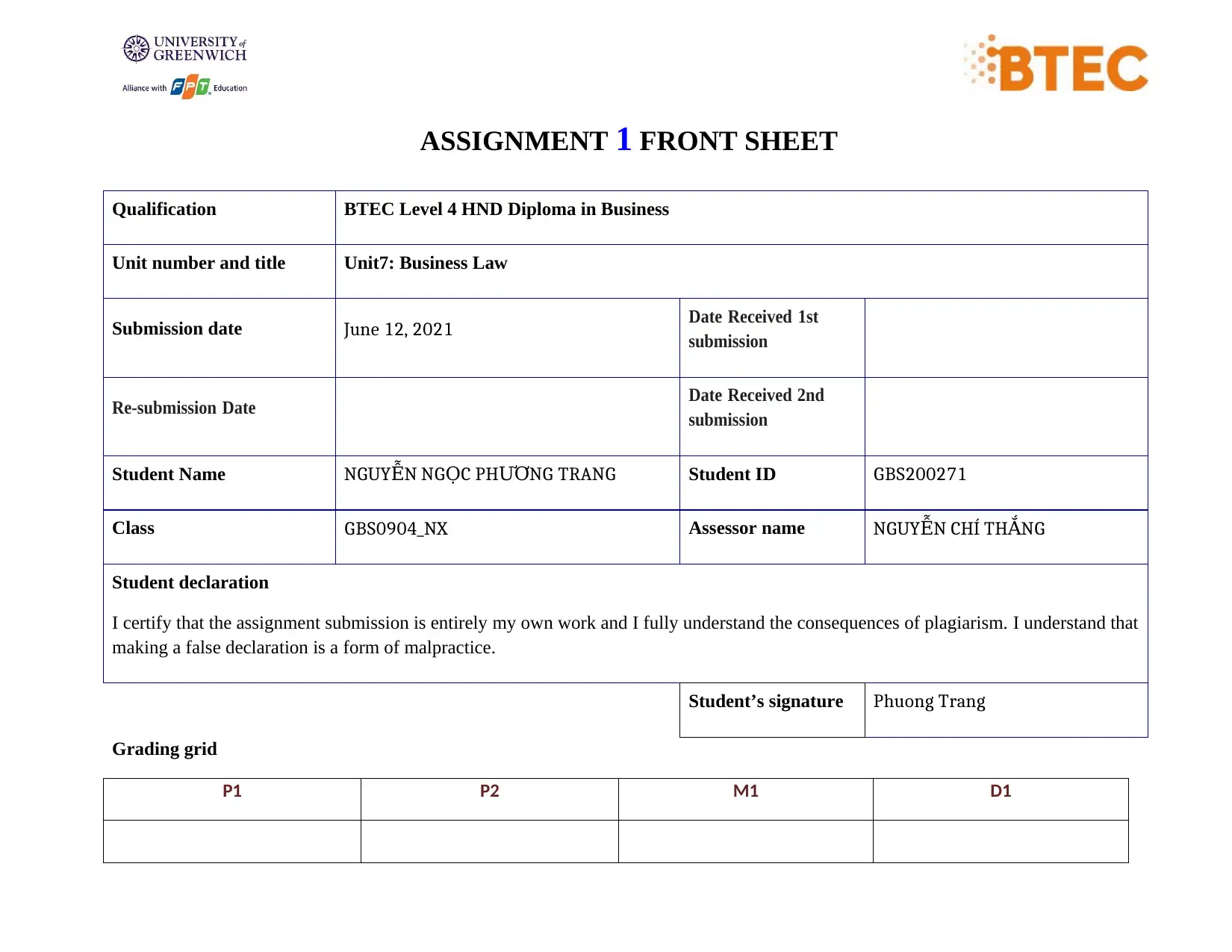
ASSIGNMENT 1 FRONT SHEET
Qualification BTEC Level 4 HND Diploma in Business
Unit number and title Unit7: Business Law
Submission date June 12, 2021 Date Received 1st
submission
Re-submission Date Date Received 2nd
submission
Student Name NGUY N NG C PH NG TRANGỄ Ọ ƯƠ Student ID GBS200271
Class GBS0904_NX Assessor name NGUY N CHÍ TH NGỄ Ắ
Student declaration
I certify that the assignment submission is entirely my own work and I fully understand the consequences of plagiarism. I understand that
making a false declaration is a form of malpractice.
Student’s signature Phuong Trang
Grading grid
P1 P2 M1 D1
Qualification BTEC Level 4 HND Diploma in Business
Unit number and title Unit7: Business Law
Submission date June 12, 2021 Date Received 1st
submission
Re-submission Date Date Received 2nd
submission
Student Name NGUY N NG C PH NG TRANGỄ Ọ ƯƠ Student ID GBS200271
Class GBS0904_NX Assessor name NGUY N CHÍ TH NGỄ Ắ
Student declaration
I certify that the assignment submission is entirely my own work and I fully understand the consequences of plagiarism. I understand that
making a false declaration is a form of malpractice.
Student’s signature Phuong Trang
Grading grid
P1 P2 M1 D1
Paraphrase This Document
Need a fresh take? Get an instant paraphrase of this document with our AI Paraphraser


Summative Feedback: Resubmission Feedback:
Grade: Assessor Signature: Date:
Internal Verifier’s Comments:
Signature & Date:
Grade: Assessor Signature: Date:
Internal Verifier’s Comments:
Signature & Date:
⊘ This is a preview!⊘
Do you want full access?
Subscribe today to unlock all pages.

Trusted by 1+ million students worldwide
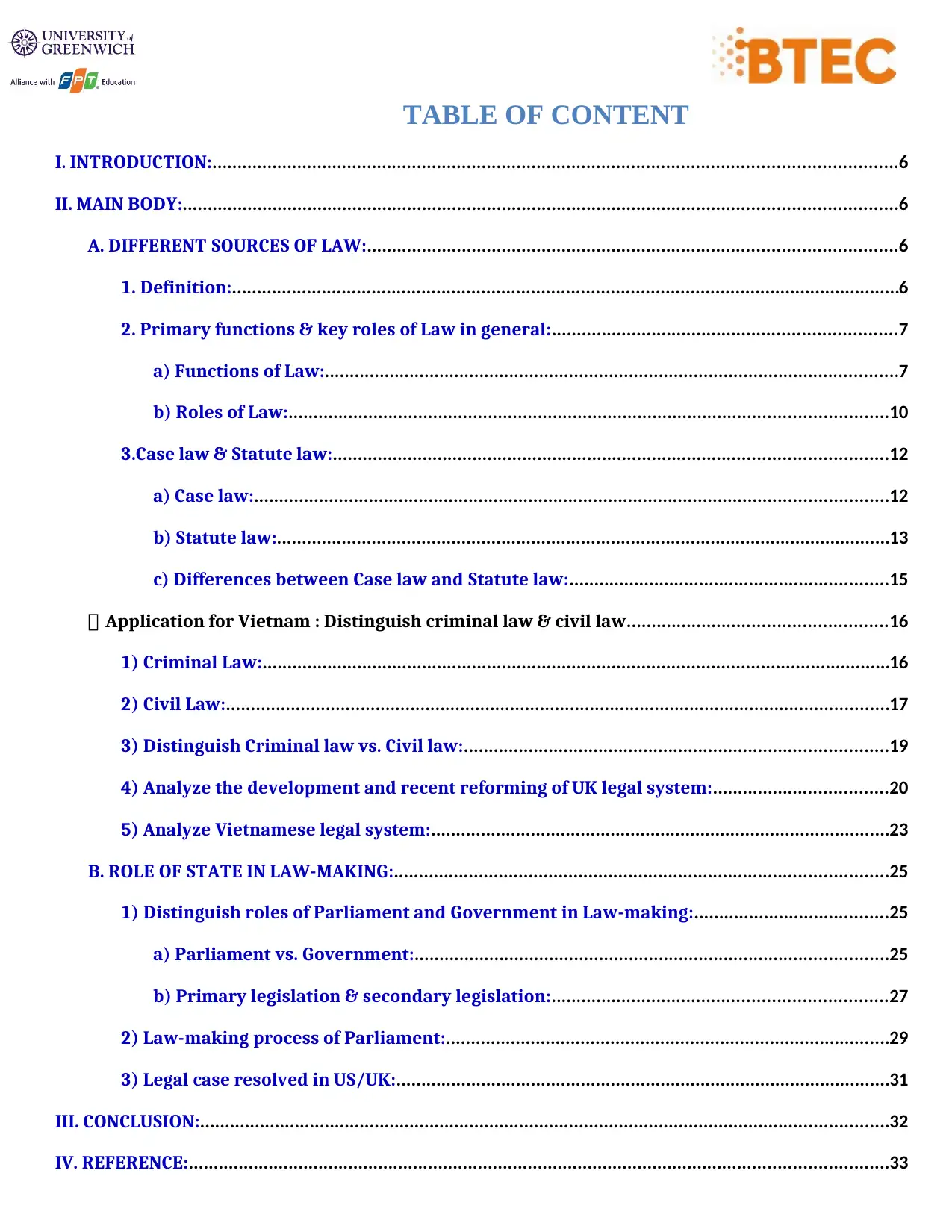
TABLE OF CONTENT
I. INTRODUCTION:.........................................................................................................................................6
II. MAIN BODY:...............................................................................................................................................6
A. DIFFERENT SOURCES OF LAW:..........................................................................................................6
1. Definition:......................................................................................................................................6
2. Primary functions & key roles of Law in general:.....................................................................7
a) Functions of Law:...................................................................................................................7
b) Roles of Law:........................................................................................................................10
3.Case law & Statute law:...............................................................................................................12
a) Case law:...............................................................................................................................12
b) Statute law:...........................................................................................................................13
c) Differences between Case law and Statute law:................................................................15
Application for Vietnam : Distinguish criminal law & civil law....................................................16
1) Criminal Law:..............................................................................................................................16
2) Civil Law:.....................................................................................................................................17
3) Distinguish Criminal law vs. Civil law:.....................................................................................19
4) Analyze the development and recent reforming of UK legal system:...................................20
5) Analyze Vietnamese legal system:............................................................................................23
B. ROLE OF STATE IN LAW-MAKING:...................................................................................................25
1) Distinguish roles of Parliament and Government in Law-making:.......................................25
a) Parliament vs. Government:...............................................................................................25
b) Primary legislation & secondary legislation:...................................................................27
2) Law-making process of Parliament:.........................................................................................29
3) Legal case resolved in US/UK:...................................................................................................31
III. CONCLUSION:..........................................................................................................................................32
IV. REFERENCE:............................................................................................................................................33
I. INTRODUCTION:.........................................................................................................................................6
II. MAIN BODY:...............................................................................................................................................6
A. DIFFERENT SOURCES OF LAW:..........................................................................................................6
1. Definition:......................................................................................................................................6
2. Primary functions & key roles of Law in general:.....................................................................7
a) Functions of Law:...................................................................................................................7
b) Roles of Law:........................................................................................................................10
3.Case law & Statute law:...............................................................................................................12
a) Case law:...............................................................................................................................12
b) Statute law:...........................................................................................................................13
c) Differences between Case law and Statute law:................................................................15
Application for Vietnam : Distinguish criminal law & civil law....................................................16
1) Criminal Law:..............................................................................................................................16
2) Civil Law:.....................................................................................................................................17
3) Distinguish Criminal law vs. Civil law:.....................................................................................19
4) Analyze the development and recent reforming of UK legal system:...................................20
5) Analyze Vietnamese legal system:............................................................................................23
B. ROLE OF STATE IN LAW-MAKING:...................................................................................................25
1) Distinguish roles of Parliament and Government in Law-making:.......................................25
a) Parliament vs. Government:...............................................................................................25
b) Primary legislation & secondary legislation:...................................................................27
2) Law-making process of Parliament:.........................................................................................29
3) Legal case resolved in US/UK:...................................................................................................31
III. CONCLUSION:..........................................................................................................................................32
IV. REFERENCE:............................................................................................................................................33
Paraphrase This Document
Need a fresh take? Get an instant paraphrase of this document with our AI Paraphraser

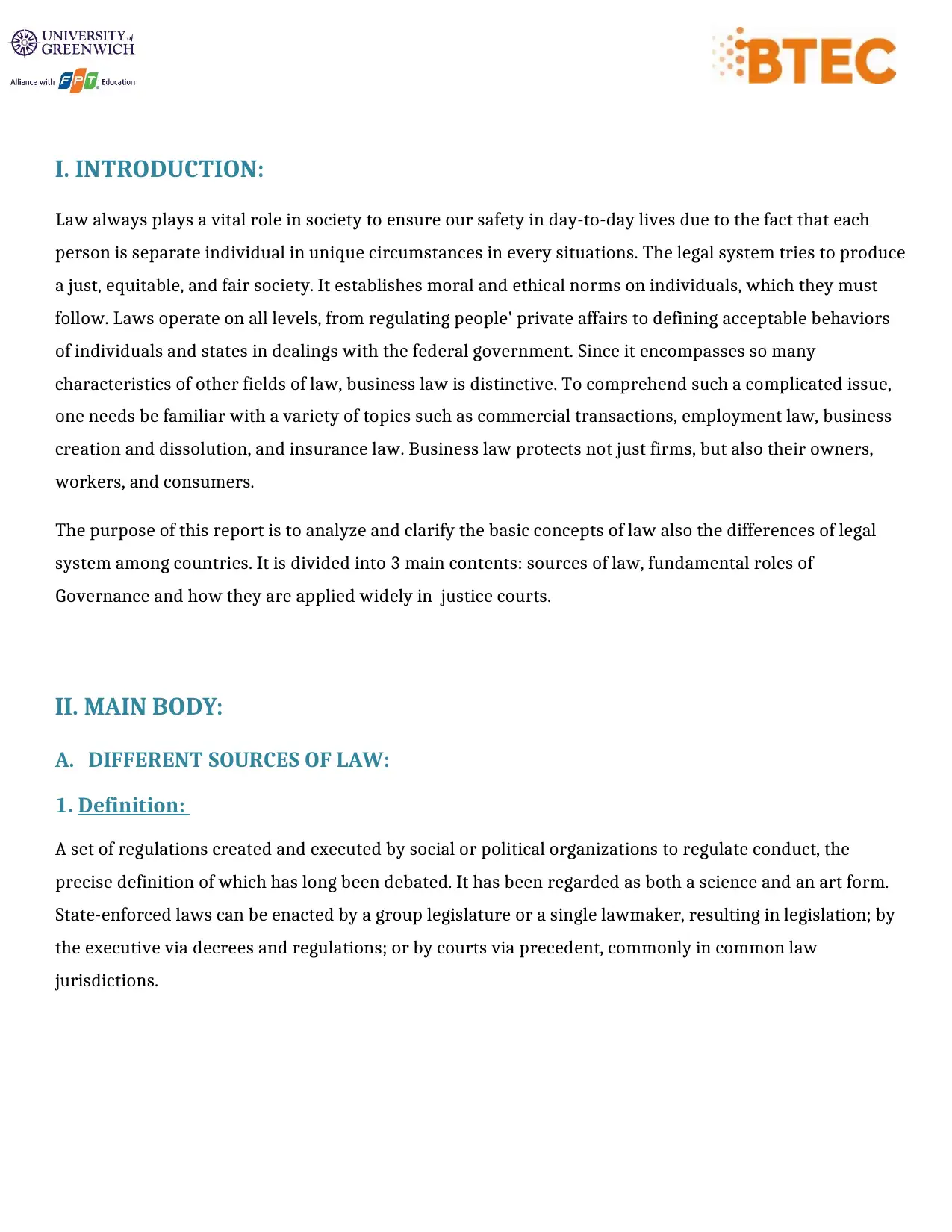
I. INTRODUCTION:
Law always plays a vital role in society to ensure our safety in day-to-day lives due to the fact that each
person is separate individual in unique circumstances in every situations. The legal system tries to produce
a just, equitable, and fair society. It establishes moral and ethical norms on individuals, which they must
follow. Laws operate on all levels, from regulating people' private affairs to defining acceptable behaviors
of individuals and states in dealings with the federal government. Since it encompasses so many
characteristics of other fields of law, business law is distinctive. To comprehend such a complicated issue,
one needs be familiar with a variety of topics such as commercial transactions, employment law, business
creation and dissolution, and insurance law. Business law protects not just firms, but also their owners,
workers, and consumers.
The purpose of this report is to analyze and clarify the basic concepts of law also the differences of legal
system among countries. It is divided into 3 main contents: sources of law, fundamental roles of
Governance and how they are applied widely in justice courts.
II. MAIN BODY:
A. DIFFERENT SOURCES OF LAW:
1. Definition:
A set of regulations created and executed by social or political organizations to regulate conduct, the
precise definition of which has long been debated. It has been regarded as both a science and an art form.
State-enforced laws can be enacted by a group legislature or a single lawmaker, resulting in legislation; by
the executive via decrees and regulations; or by courts via precedent, commonly in common law
jurisdictions.
Law always plays a vital role in society to ensure our safety in day-to-day lives due to the fact that each
person is separate individual in unique circumstances in every situations. The legal system tries to produce
a just, equitable, and fair society. It establishes moral and ethical norms on individuals, which they must
follow. Laws operate on all levels, from regulating people' private affairs to defining acceptable behaviors
of individuals and states in dealings with the federal government. Since it encompasses so many
characteristics of other fields of law, business law is distinctive. To comprehend such a complicated issue,
one needs be familiar with a variety of topics such as commercial transactions, employment law, business
creation and dissolution, and insurance law. Business law protects not just firms, but also their owners,
workers, and consumers.
The purpose of this report is to analyze and clarify the basic concepts of law also the differences of legal
system among countries. It is divided into 3 main contents: sources of law, fundamental roles of
Governance and how they are applied widely in justice courts.
II. MAIN BODY:
A. DIFFERENT SOURCES OF LAW:
1. Definition:
A set of regulations created and executed by social or political organizations to regulate conduct, the
precise definition of which has long been debated. It has been regarded as both a science and an art form.
State-enforced laws can be enacted by a group legislature or a single lawmaker, resulting in legislation; by
the executive via decrees and regulations; or by courts via precedent, commonly in common law
jurisdictions.
⊘ This is a preview!⊘
Do you want full access?
Subscribe today to unlock all pages.

Trusted by 1+ million students worldwide
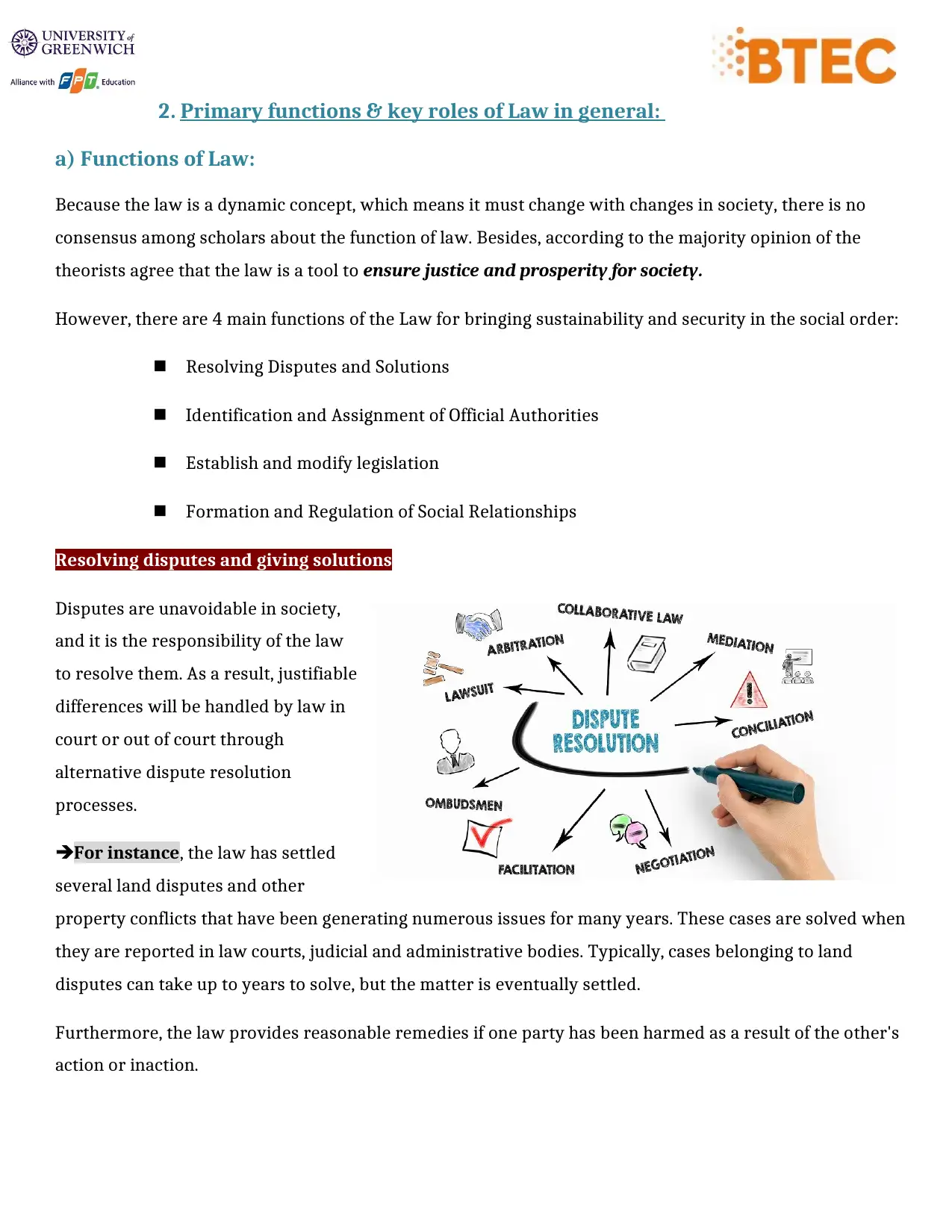
2. Primary functions & key roles of Law in general:
a) Functions of Law:
Because the law is a dynamic concept, which means it must change with changes in society, there is no
consensus among scholars about the function of law. Besides, according to the majority opinion of the
theorists agree that the law is a tool to ensure justice and prosperity for society.
However, there are 4 main functions of the Law for bringing sustainability and security in the social order:
Resolving Disputes and Solutions
Identification and Assignment of Official Authorities
Establish and modify legislation
Formation and Regulation of Social Relationships
Resolving disputes and giving solutions
Disputes are unavoidable in society,
and it is the responsibility of the law
to resolve them. As a result, justifiable
differences will be handled by law in
court or out of court through
alternative dispute resolution
processes.
èFor instance, the law has settled
several land disputes and other
property conflicts that have been generating numerous issues for many years. These cases are solved when
they are reported in law courts, judicial and administrative bodies. Typically, cases belonging to land
disputes can take up to years to solve, but the matter is eventually settled.
Furthermore, the law provides reasonable remedies if one party has been harmed as a result of the other's
action or inaction.
a) Functions of Law:
Because the law is a dynamic concept, which means it must change with changes in society, there is no
consensus among scholars about the function of law. Besides, according to the majority opinion of the
theorists agree that the law is a tool to ensure justice and prosperity for society.
However, there are 4 main functions of the Law for bringing sustainability and security in the social order:
Resolving Disputes and Solutions
Identification and Assignment of Official Authorities
Establish and modify legislation
Formation and Regulation of Social Relationships
Resolving disputes and giving solutions
Disputes are unavoidable in society,
and it is the responsibility of the law
to resolve them. As a result, justifiable
differences will be handled by law in
court or out of court through
alternative dispute resolution
processes.
èFor instance, the law has settled
several land disputes and other
property conflicts that have been generating numerous issues for many years. These cases are solved when
they are reported in law courts, judicial and administrative bodies. Typically, cases belonging to land
disputes can take up to years to solve, but the matter is eventually settled.
Furthermore, the law provides reasonable remedies if one party has been harmed as a result of the other's
action or inaction.
Paraphrase This Document
Need a fresh take? Get an instant paraphrase of this document with our AI Paraphraser
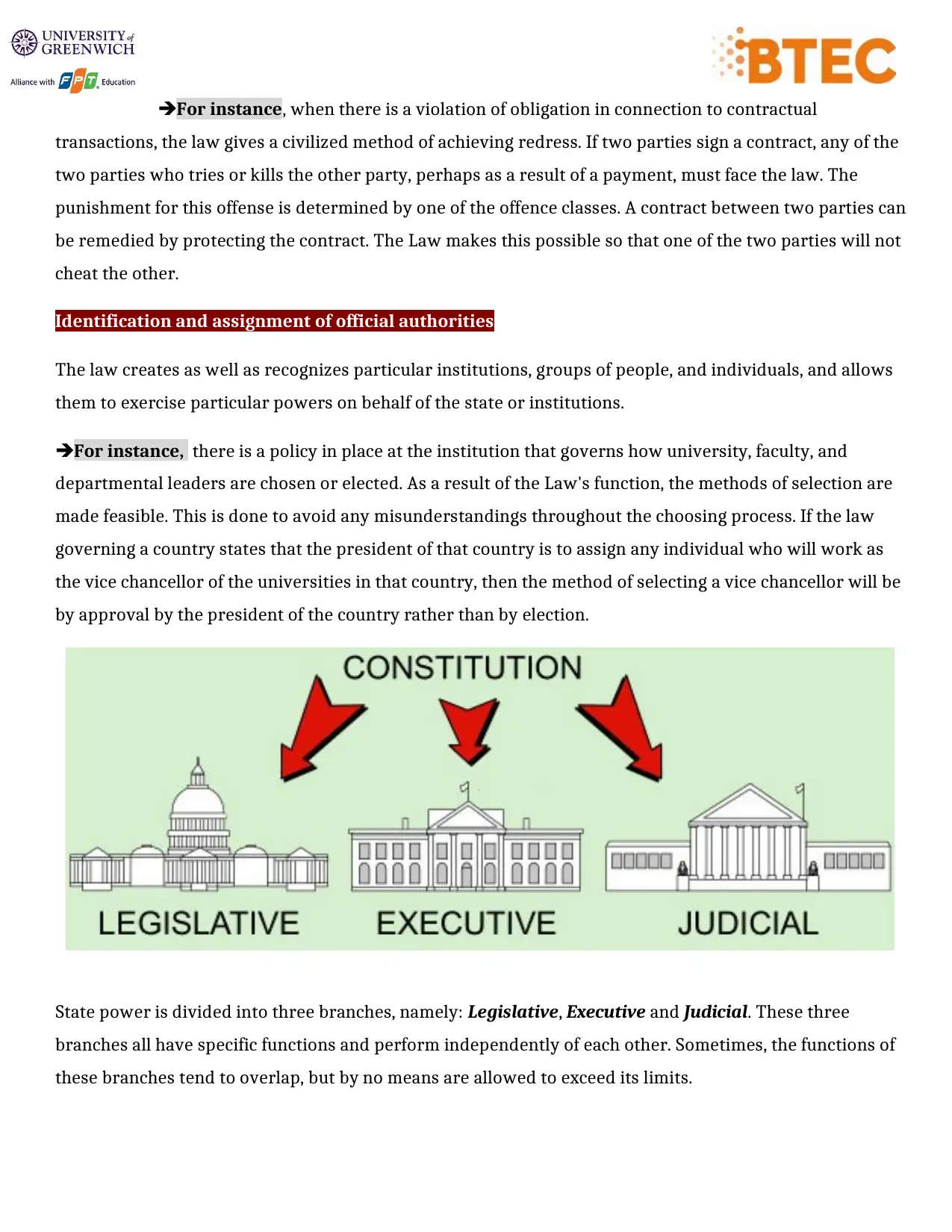
èFor instance, when there is a violation of obligation in connection to contractual
transactions, the law gives a civilized method of achieving redress. If two parties sign a contract, any of the
two parties who tries or kills the other party, perhaps as a result of a payment, must face the law. The
punishment for this offense is determined by one of the offence classes. A contract between two parties can
be remedied by protecting the contract. The Law makes this possible so that one of the two parties will not
cheat the other.
Identification and assignment of official authorities
The law creates as well as recognizes particular institutions, groups of people, and individuals, and allows
them to exercise particular powers on behalf of the state or institutions.
èFor instance, there is a policy in place at the institution that governs how university, faculty, and
departmental leaders are chosen or elected. As a result of the Law's function, the methods of selection are
made feasible. This is done to avoid any misunderstandings throughout the choosing process. If the law
governing a country states that the president of that country is to assign any individual who will work as
the vice chancellor of the universities in that country, then the method of selecting a vice chancellor will be
by approval by the president of the country rather than by election.
State power is divided into three branches, namely: Legislative, Executive and Judicial. These three
branches all have specific functions and perform independently of each other. Sometimes, the functions of
these branches tend to overlap, but by no means are allowed to exceed its limits.
transactions, the law gives a civilized method of achieving redress. If two parties sign a contract, any of the
two parties who tries or kills the other party, perhaps as a result of a payment, must face the law. The
punishment for this offense is determined by one of the offence classes. A contract between two parties can
be remedied by protecting the contract. The Law makes this possible so that one of the two parties will not
cheat the other.
Identification and assignment of official authorities
The law creates as well as recognizes particular institutions, groups of people, and individuals, and allows
them to exercise particular powers on behalf of the state or institutions.
èFor instance, there is a policy in place at the institution that governs how university, faculty, and
departmental leaders are chosen or elected. As a result of the Law's function, the methods of selection are
made feasible. This is done to avoid any misunderstandings throughout the choosing process. If the law
governing a country states that the president of that country is to assign any individual who will work as
the vice chancellor of the universities in that country, then the method of selecting a vice chancellor will be
by approval by the president of the country rather than by election.
State power is divided into three branches, namely: Legislative, Executive and Judicial. These three
branches all have specific functions and perform independently of each other. Sometimes, the functions of
these branches tend to overlap, but by no means are allowed to exceed its limits.
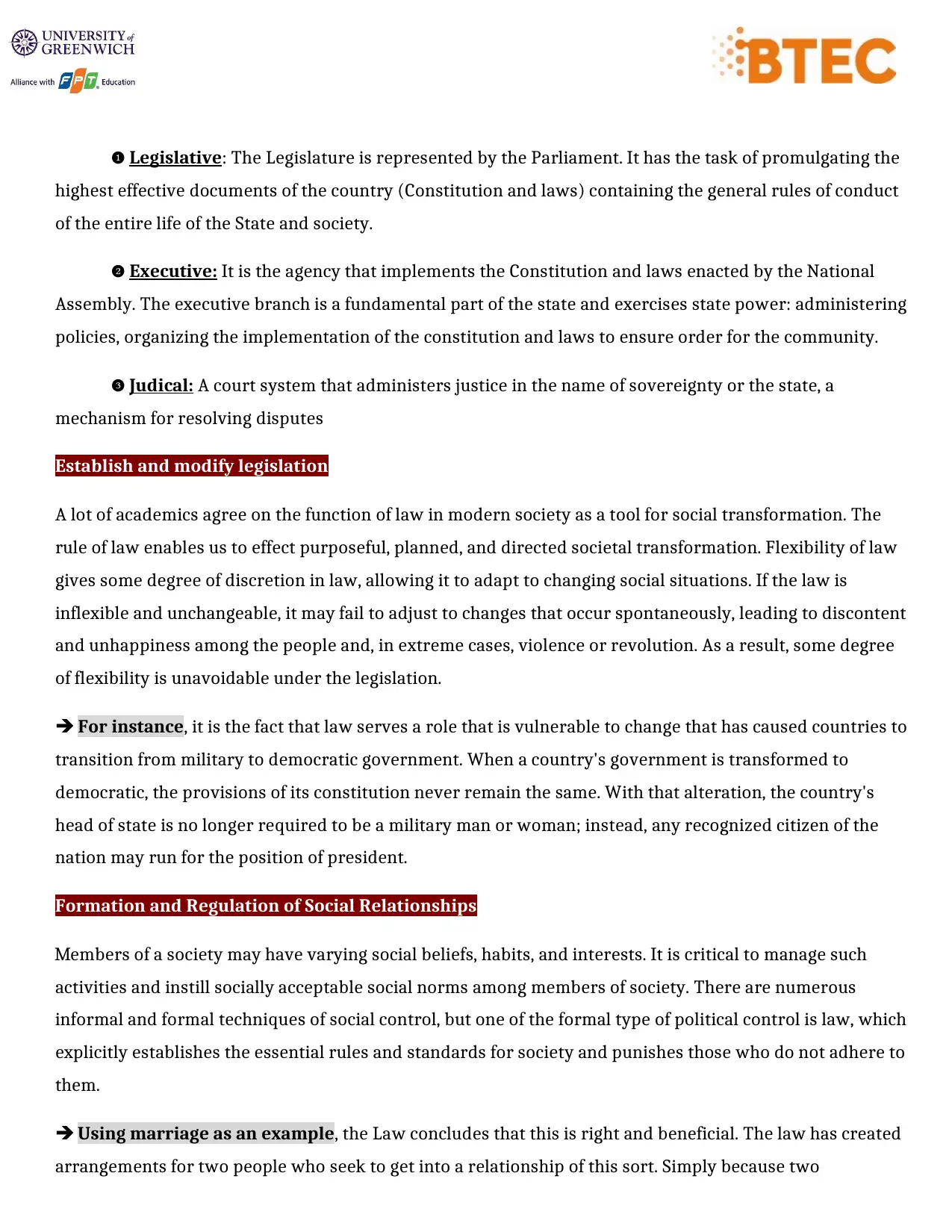
❶ Legislative: The Legislature is represented by the Parliament. It has the task of promulgating the
highest effective documents of the country (Constitution and laws) containing the general rules of conduct
of the entire life of the State and society.
❷ Executive: It is the agency that implements the Constitution and laws enacted by the National
Assembly. The executive branch is a fundamental part of the state and exercises state power: administering
policies, organizing the implementation of the constitution and laws to ensure order for the community.
❸ Judical: A court system that administers justice in the name of sovereignty or the state, a
mechanism for resolving disputes
Establish and modify legislation
A lot of academics agree on the function of law in modern society as a tool for social transformation. The
rule of law enables us to effect purposeful, planned, and directed societal transformation. Flexibility of law
gives some degree of discretion in law, allowing it to adapt to changing social situations. If the law is
inflexible and unchangeable, it may fail to adjust to changes that occur spontaneously, leading to discontent
and unhappiness among the people and, in extreme cases, violence or revolution. As a result, some degree
of flexibility is unavoidable under the legislation.
è For instance, it is the fact that law serves a role that is vulnerable to change that has caused countries to
transition from military to democratic government. When a country's government is transformed to
democratic, the provisions of its constitution never remain the same. With that alteration, the country's
head of state is no longer required to be a military man or woman; instead, any recognized citizen of the
nation may run for the position of president.
Formation and Regulation of Social Relationships
Members of a society may have varying social beliefs, habits, and interests. It is critical to manage such
activities and instill socially acceptable social norms among members of society. There are numerous
informal and formal techniques of social control, but one of the formal type of political control is law, which
explicitly establishes the essential rules and standards for society and punishes those who do not adhere to
them.
è Using marriage as an example, the Law concludes that this is right and beneficial. The law has created
arrangements for two people who seek to get into a relationship of this sort. Simply because two
highest effective documents of the country (Constitution and laws) containing the general rules of conduct
of the entire life of the State and society.
❷ Executive: It is the agency that implements the Constitution and laws enacted by the National
Assembly. The executive branch is a fundamental part of the state and exercises state power: administering
policies, organizing the implementation of the constitution and laws to ensure order for the community.
❸ Judical: A court system that administers justice in the name of sovereignty or the state, a
mechanism for resolving disputes
Establish and modify legislation
A lot of academics agree on the function of law in modern society as a tool for social transformation. The
rule of law enables us to effect purposeful, planned, and directed societal transformation. Flexibility of law
gives some degree of discretion in law, allowing it to adapt to changing social situations. If the law is
inflexible and unchangeable, it may fail to adjust to changes that occur spontaneously, leading to discontent
and unhappiness among the people and, in extreme cases, violence or revolution. As a result, some degree
of flexibility is unavoidable under the legislation.
è For instance, it is the fact that law serves a role that is vulnerable to change that has caused countries to
transition from military to democratic government. When a country's government is transformed to
democratic, the provisions of its constitution never remain the same. With that alteration, the country's
head of state is no longer required to be a military man or woman; instead, any recognized citizen of the
nation may run for the position of president.
Formation and Regulation of Social Relationships
Members of a society may have varying social beliefs, habits, and interests. It is critical to manage such
activities and instill socially acceptable social norms among members of society. There are numerous
informal and formal techniques of social control, but one of the formal type of political control is law, which
explicitly establishes the essential rules and standards for society and punishes those who do not adhere to
them.
è Using marriage as an example, the Law concludes that this is right and beneficial. The law has created
arrangements for two people who seek to get into a relationship of this sort. Simply because two
⊘ This is a preview!⊘
Do you want full access?
Subscribe today to unlock all pages.

Trusted by 1+ million students worldwide
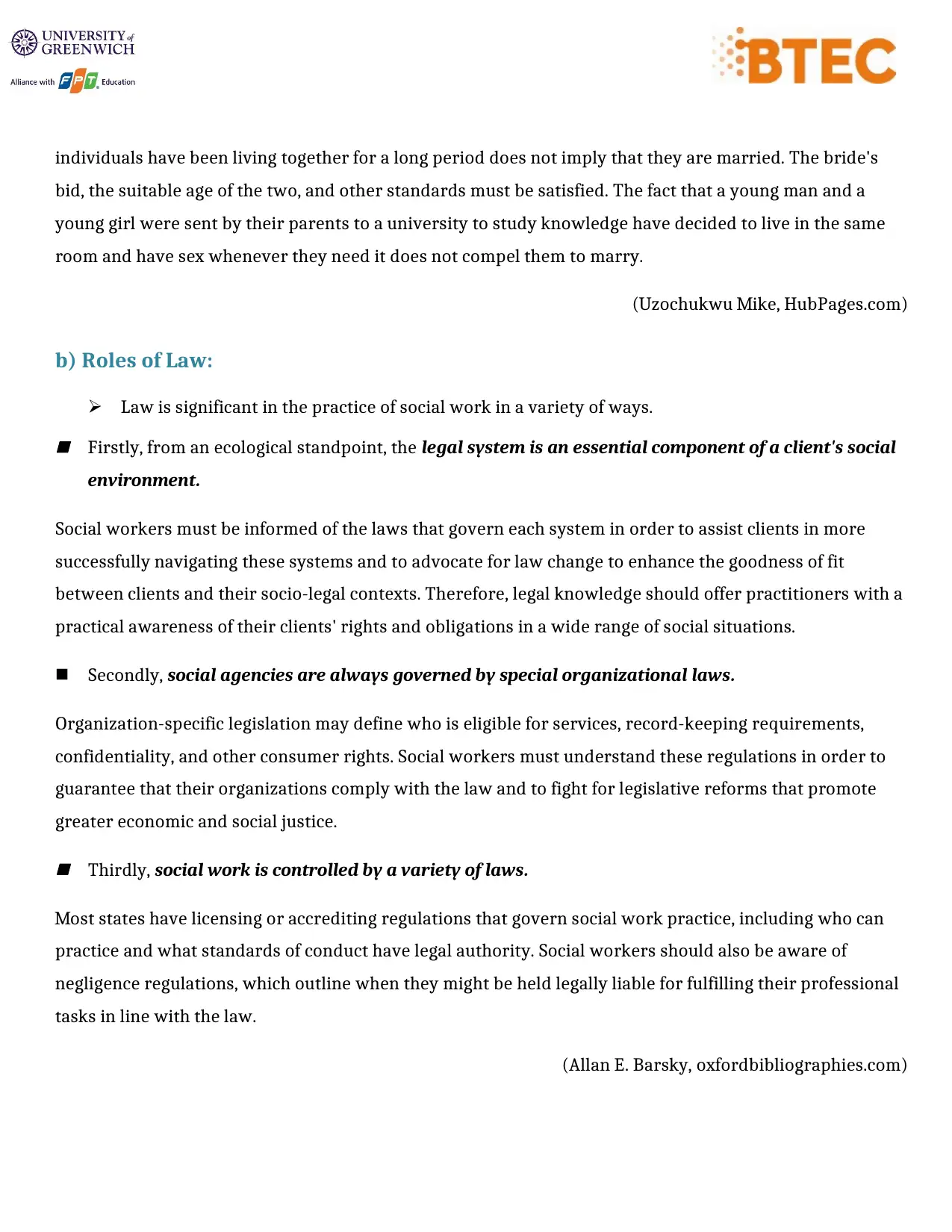
individuals have been living together for a long period does not imply that they are married. The bride's
bid, the suitable age of the two, and other standards must be satisfied. The fact that a young man and a
young girl were sent by their parents to a university to study knowledge have decided to live in the same
room and have sex whenever they need it does not compel them to marry.
(Uzochukwu Mike, HubPages.com)
b) Roles of Law:
Law is significant in the practice of social work in a variety of ways.
Firstly, from an ecological standpoint, the legal system is an essential component of a client's social
environment.
Social workers must be informed of the laws that govern each system in order to assist clients in more
successfully navigating these systems and to advocate for law change to enhance the goodness of fit
between clients and their socio-legal contexts. Therefore, legal knowledge should offer practitioners with a
practical awareness of their clients' rights and obligations in a wide range of social situations.
Secondly, social agencies are always governed by special organizational laws.
Organization-specific legislation may define who is eligible for services, record-keeping requirements,
confidentiality, and other consumer rights. Social workers must understand these regulations in order to
guarantee that their organizations comply with the law and to fight for legislative reforms that promote
greater economic and social justice.
Thirdly, social work is controlled by a variety of laws.
Most states have licensing or accrediting regulations that govern social work practice, including who can
practice and what standards of conduct have legal authority. Social workers should also be aware of
negligence regulations, which outline when they might be held legally liable for fulfilling their professional
tasks in line with the law.
(Allan E. Barsky, oxfordbibliographies.com)
bid, the suitable age of the two, and other standards must be satisfied. The fact that a young man and a
young girl were sent by their parents to a university to study knowledge have decided to live in the same
room and have sex whenever they need it does not compel them to marry.
(Uzochukwu Mike, HubPages.com)
b) Roles of Law:
Law is significant in the practice of social work in a variety of ways.
Firstly, from an ecological standpoint, the legal system is an essential component of a client's social
environment.
Social workers must be informed of the laws that govern each system in order to assist clients in more
successfully navigating these systems and to advocate for law change to enhance the goodness of fit
between clients and their socio-legal contexts. Therefore, legal knowledge should offer practitioners with a
practical awareness of their clients' rights and obligations in a wide range of social situations.
Secondly, social agencies are always governed by special organizational laws.
Organization-specific legislation may define who is eligible for services, record-keeping requirements,
confidentiality, and other consumer rights. Social workers must understand these regulations in order to
guarantee that their organizations comply with the law and to fight for legislative reforms that promote
greater economic and social justice.
Thirdly, social work is controlled by a variety of laws.
Most states have licensing or accrediting regulations that govern social work practice, including who can
practice and what standards of conduct have legal authority. Social workers should also be aware of
negligence regulations, which outline when they might be held legally liable for fulfilling their professional
tasks in line with the law.
(Allan E. Barsky, oxfordbibliographies.com)
Paraphrase This Document
Need a fresh take? Get an instant paraphrase of this document with our AI Paraphraser
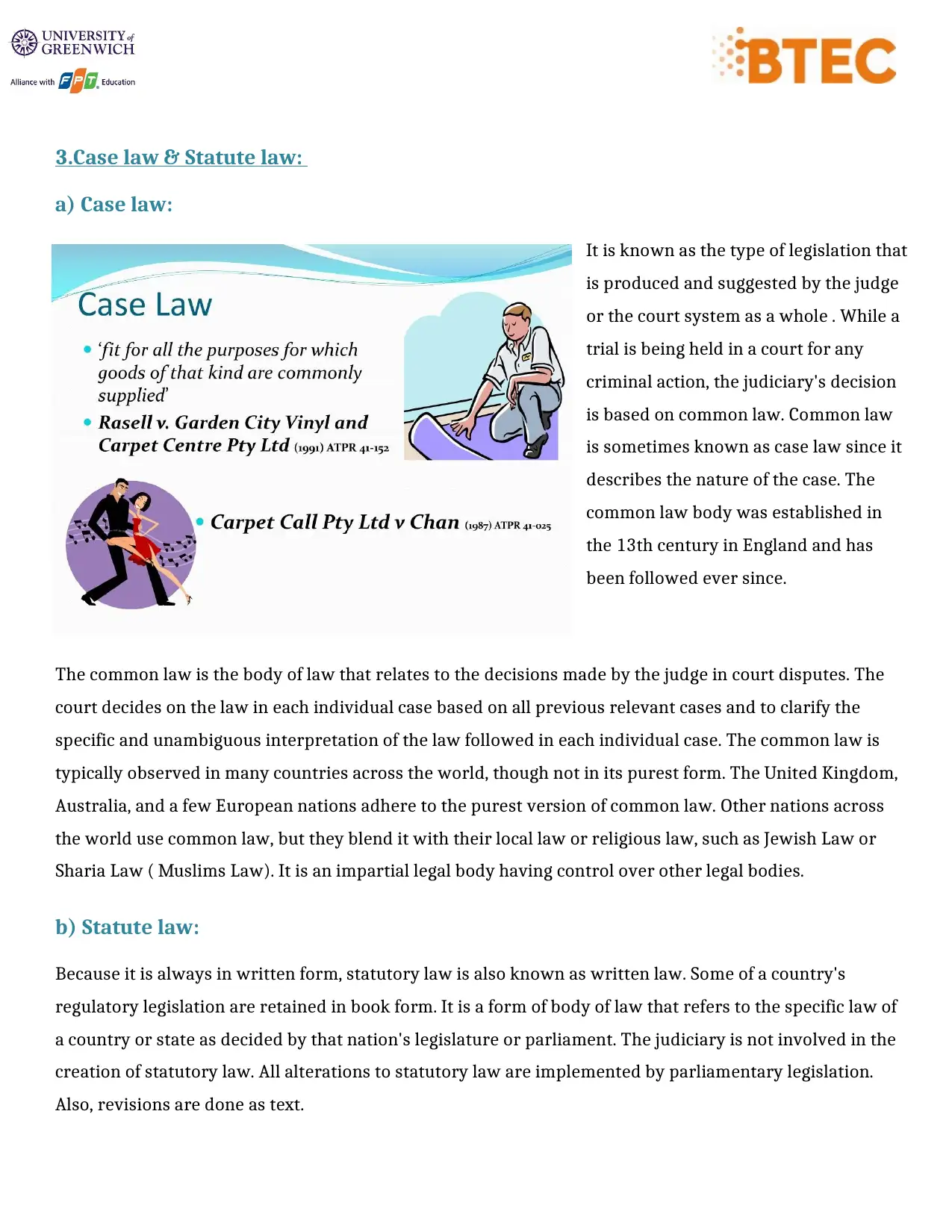
3.Case law & Statute law:
a) Case law:
It is known as the type of legislation that
is produced and suggested by the judge
or the court system as a whole . While a
trial is being held in a court for any
criminal action, the judiciary's decision
is based on common law. Common law
is sometimes known as case law since it
describes the nature of the case. The
common law body was established in
the 13th century in England and has
been followed ever since.
The common law is the body of law that relates to the decisions made by the judge in court disputes. The
court decides on the law in each individual case based on all previous relevant cases and to clarify the
specific and unambiguous interpretation of the law followed in each individual case. The common law is
typically observed in many countries across the world, though not in its purest form. The United Kingdom,
Australia, and a few European nations adhere to the purest version of common law. Other nations across
the world use common law, but they blend it with their local law or religious law, such as Jewish Law or
Sharia Law ( Muslims Law). It is an impartial legal body having control over other legal bodies.
b) Statute law:
Because it is always in written form, statutory law is also known as written law. Some of a country's
regulatory legislation are retained in book form. It is a form of body of law that refers to the specific law of
a country or state as decided by that nation's legislature or parliament. The judiciary is not involved in the
creation of statutory law. All alterations to statutory law are implemented by parliamentary legislation.
Also, revisions are done as text.
a) Case law:
It is known as the type of legislation that
is produced and suggested by the judge
or the court system as a whole . While a
trial is being held in a court for any
criminal action, the judiciary's decision
is based on common law. Common law
is sometimes known as case law since it
describes the nature of the case. The
common law body was established in
the 13th century in England and has
been followed ever since.
The common law is the body of law that relates to the decisions made by the judge in court disputes. The
court decides on the law in each individual case based on all previous relevant cases and to clarify the
specific and unambiguous interpretation of the law followed in each individual case. The common law is
typically observed in many countries across the world, though not in its purest form. The United Kingdom,
Australia, and a few European nations adhere to the purest version of common law. Other nations across
the world use common law, but they blend it with their local law or religious law, such as Jewish Law or
Sharia Law ( Muslims Law). It is an impartial legal body having control over other legal bodies.
b) Statute law:
Because it is always in written form, statutory law is also known as written law. Some of a country's
regulatory legislation are retained in book form. It is a form of body of law that refers to the specific law of
a country or state as decided by that nation's legislature or parliament. The judiciary is not involved in the
creation of statutory law. All alterations to statutory law are implemented by parliamentary legislation.
Also, revisions are done as text.
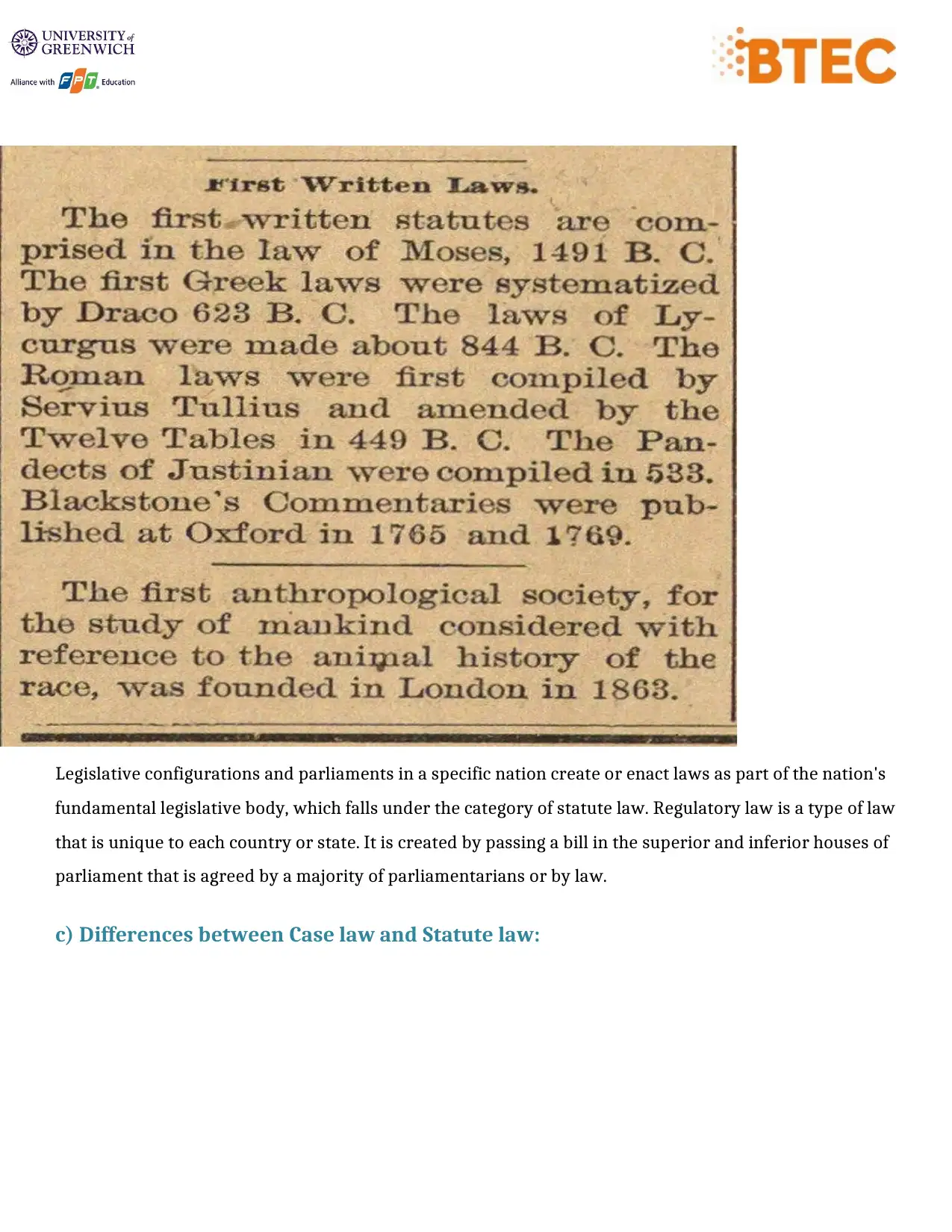
Legislative configurations and parliaments in a specific nation create or enact laws as part of the nation's
fundamental legislative body, which falls under the category of statute law. Regulatory law is a type of law
that is unique to each country or state. It is created by passing a bill in the superior and inferior houses of
parliament that is agreed by a majority of parliamentarians or by law.
c) Differences between Case law and Statute law:
fundamental legislative body, which falls under the category of statute law. Regulatory law is a type of law
that is unique to each country or state. It is created by passing a bill in the superior and inferior houses of
parliament that is agreed by a majority of parliamentarians or by law.
c) Differences between Case law and Statute law:
⊘ This is a preview!⊘
Do you want full access?
Subscribe today to unlock all pages.

Trusted by 1+ million students worldwide
1 out of 31
Related Documents
Your All-in-One AI-Powered Toolkit for Academic Success.
+13062052269
info@desklib.com
Available 24*7 on WhatsApp / Email
![[object Object]](/_next/static/media/star-bottom.7253800d.svg)
Unlock your academic potential
Copyright © 2020–2025 A2Z Services. All Rights Reserved. Developed and managed by ZUCOL.





